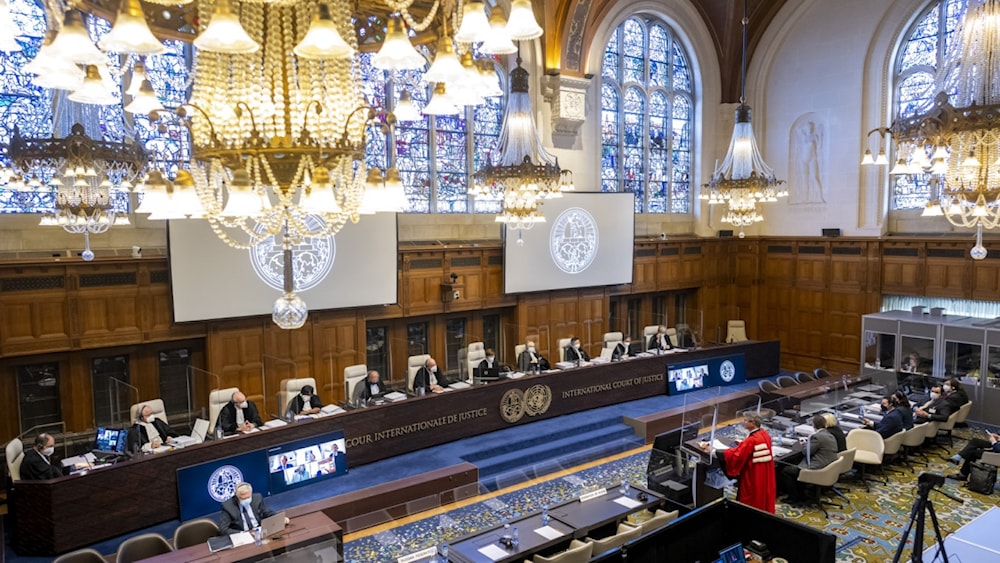'Israel' names ex-Supreme Court President Aharon Barak for ICJ panel
Barak was a point of contention for members of Prime Minister Benjamin Netanyahu's administration, whose judicial reform campaign last year split the Israelis.
-

The ICJ hearing in which Russia was ordered to "immediately suspend" its military operation in Ukraine, March 2022. (ICJ)
An Israeli official announced on Sunday that "Israel" has selected former Supreme Court President Aharon Barak as its appointee to the 15-judge panel at the International Court of Justice (ICJ) for the hearing of a genocide complaint lodged against it this week.
Chosen Barak was a point of contention for members of Prime Minister Benjamin Netanyahu's administration, whose judicial reform campaign last year split the Israelis, with the retired judge being vocally critical of it.
Last week, Netanyahu accused South Africa of "cowardice" and falsehood in launching a genocide lawsuit against "Israel", claiming that the Israeli occupation forces (IOF) are the "most moral" army in the world.
Read more: US denies genocide in Gaza, calls S.Africa ICJ case unproductive
South Africa, which has accused "Israel" of genocide in Gaza, has also selected an ad hoc judge, former deputy chief justice Dikgang Moseneke, according to South African media.
Netanyahu has reportedly also expressed a desire for US lawyer Alan Dershowitz to represent "Israel" at the upcoming International Court of Justice hearing next week, Barak David, an AXIOS reporter, said in a post on X on Monday.
Who is Aharon Barak?
Shortly before the Nakba, Aharon Barak settled in Palestine in 1947.
Lauding the former Supreme Court President, while taking a swing at Netanyahu, former Mertz Party leader Zahava Gal-On posted on X that at The Hague, Barak will "continue to ignore the fact that the government he will defend made him a target for years, more than two decades after he left office. It’s a government that does not deserve its citizens."
However, according to an article published in Haaretz by Hagai El-Ad, a former executive director of B’Tselem, Aharon Barak held top roles in "Israel's" judicial system for three decades, from 1975 to 2006, first as attorney general, then as a Supreme Court justice, and ultimately as chief justice.
El-Ad calls Barak one of the chief architects of "Israel's" current state of affairs.
In his piece, he details how Barak got very angry about his hearing before the UN regarding "Israel's" human rights violations. Commenting on El-Ad's move, Barak said at the time, "I too am pained when I hear about an Israeli going before the Security Council and – in front of all the other delegates whose countries, each and every one, engages in human rights violations, much more than we do – makes these speeches there, and they applaud him. It made me very mad, very mad. I was angry about that."
But this brings to question Barak's perception of justice, especially as El-Ad wondered then, "Could it be that Barak has a problem with what was said, rather than where it was said?"
He also accuses Barak of legitimizing, through his rulings, a "system of land grab" that gives Palestinian land to Jews in occupied Palestine and allows "Israel" to continue its torture practice. While Barak claimed that he was against it, he did, in fact, according to the Israeli author, end up paving a new way for "Israel" to pursue it.
He is quoted as saying, "I left that question open," as he goes on to explain that punitive home demolitions are "a very, very, very complex issue."
Commenting on Barak's "complex" approach toward home demolition, El-Ad reminds the former Supreme Court President that collective punishment and harming innocent lives are prohibited, calling them "basic moral principles." He also reminds him of Article 33 of the Fourth Geneva Convention, which says: "No protected person may be punished for an offense he or she has not personally committed. Collective penalties and likewise all measures of intimidation or of terrorism are prohibited… Reprisals against protected persons and their property are prohibited," accusing him of trampling on it while passing off his rulings "as effective judicial review in a democracy."
El-Ad also Barak of "whitewashing the trampling of human rights" as "Israel" prevents Palestinians from obtaining building permits, and the Supreme Court, of course, upholds the system.
The Israeli author ends his article by saying, "Once military lawyers, state attorneys and Supreme Court justices are done masterfully chiseling out legal opinions, all that remains is raw injustice."
According to El-Ad, this is, in a nutshell, the legacy of Aharon Barak who will represent "Israel" at the ICJ.

 4 Min Read
4 Min Read











